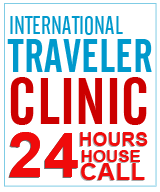TRAVELLERS DIARRHEA
Acute diarrhea is the most common illness among travelers. Up to 55% of people who travel from developed countries to developing countries are affected. The classic definition of traveler’s diarrhea is three or more unformed stools in 24 hours accompanied by at least one of the following symptom: fever, nausea, vomiting, abdominal cramps, or bloody stools. Most cases occur within the first two week of travel. And last approximately 4 days without treatment. Although travelers’ diarrhea rarely is life threatening, it can pose many problems in travelers as they may be bedridden for 1 to 2 days and may need to alter flights, tours, and business meetings.
Destination is the most significant risk factor for developing traveler’s diarrhea. Regions with the highest risk are Africa, South Asia, Latin America, and the Middle East.
RISK FOR TRAVELERS
Food and water contaminated with fecal matter are the main cause of travelers diarrhea. Unsafe foods and beverages include salads, unpeeled fruits, raw or poorly cooked meats and seafood, un-pasteurized dairy products and tap water. The organisms causing traveler’s diarrhea are bacteria, viruses , and parasites, among these bacterias are responsible for 80 to 85% of cases.
Food poisoning is another common causes of diarrhea among travelers. Food poisoning is caused by ingestion of preformed toxins in food contaminated with bacteria. It is characterized by a short incubation period (one to six hours )
and symptoms typically resolve in 24 hours. Many times nausea and vomiting is a predominant feature.
PREVENTION
Travelers are advised to eat foods that are freshly cooked and served piping hot and to avoid water and beverages diluted with non-portable water (reconstituted fruit juices, ice, and milk) and foods washed in non-portable water, such as salads. Other risky foods include raw or undercooked meat and seafood and raw fruits and vegetables. Safe beverages include those that are bottled and sealed or carbonated. Boiled beverages and those appropriately treated with iodine or chlorine might also be safely consumed. Studies of TD risk at high-risk destinations show that consumption of food or beverages from street vendors poses a particularly high risk, and some studies suggest certain food items, such as reheated prepared foods or buffet items are high risk.
Antibiotic prophylaxis is not recommended by the Centers of Disease Control and Prevention because it can lead to drug resistant organisms. Bismulth subsalicylate (Pepto-Bismol) provides a rate of protection of about 60 percent. However, it is not recommended in persons taking anticoagulants of travelers taking doxycycline for malaria prophylaxis. Generally, probiotics are a more natural approach to prevention, and studies have shown protection rates of up to 47% . Eating yoghurt containing lactobacillus allows the gastrointestinal tract to become colonized and prevent other “bad” bacteria from infection the gut.
TREATMENT
Most cases of travelers diarrhea are self limited, but antibiotics have been shown to reduce the duration and severity of illness. Antibiotics do not help in cases of food poisoning. Waiting 24 hours to confirm a diagnosis may result in unnecessary discomfort and time away from activities. Therefore, a doctor may prescribe antibiotics on the first visit. Generally a quinolone antibiotic is used, such as Ciprofloxacin. In children and pregnant women Azithromycin
(Zithromax) is used.
Bismuth subsalicylate (BSS or Pepto-Bismol), taken as 1 oz of liquid or two chewable tablets every 30 minutes for eight doses, has been shown to decrease stool frequency and shorten the duration of illness in several placebo-controlled studies(14) . This agent has both antisecretory and antimicrobial properties. BSS should be used with caution in travelers on aspirin therapy or anticoagulants or those who have renal insufficiency. In addition, BSS should be avoided in children with viral infections, such as varicella or influenza, because of the risk of Reye syndrome.
Antimotility agents provide symptomatic relief and serve as useful adjuncts to antibiotics therapy in TD. Synthetic opiates, such as loperamide (Immodium) and diphenoxylate (Lomotil) can reduce bowel movement frequency and enable travelers to resume their activities while awaiting the effects of antibiotics. Loperamide appears to have antisecretory properties as well. These agents should not be used by travelers in diarrheal illness associated with high fever or blood in the stool, rather they should seek medical attention. Loperamide and diphenoxylate are not recommended for children <12 years of age.
Fluid and electrolytes are lost in cases of TD, and replenishment is important, especially in young children or adults with chronic medical illness. In adult travelers who are otherwise healthy, severe dhydration resulting from TD is unusal unless vomiting is present. Nonetheless, replacement of fluid losses remains an important adjunct to other therapy. Travelers should remember to use only beverages that are sealed or carbonated. For more severe fluid loss, replacement is best accomplished with oral rehydration solutions (ORS), such as World Health Organization ORS solution, which are widely available at stores and pharmacies in most developing countries
By DR. Nina Srikureja
All right reserved Global Doctor Clinic Bangkok, Thailand





